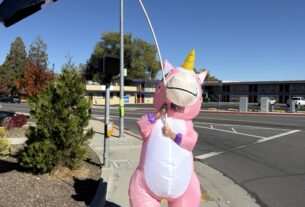We in Lassen County are represented in Congress by Representative Doug LaMalfa. In his letter to LassenNews.com (July 11, 2025, Special to LassenNews.com), Representative LaMalfa cast the effects of the “One Big Beautiful Bill Act,” (the actual name of the recent budget act signed into law by President Trump) in a most positive light. Lacking details and context, Representative LaMalfa’s letter provided a view not shared by many outside of the congressional republicans.
Representative LaMalfa asserted that the law provides “the strongest tax relief” seen in years. He also suggested that the law “makes updates” to Medi-Cal (Medicaid in other states) that “focus on those who truly rely on it.” He also says that the new law makes “sensible changes to SNAP,” (food assistance to families in need) that control costs and keep the program “focused on those truly in need.” In addition, Representative LaMalfa reported changes in water and forest management, energy security and border security.
With so much to say and so many points to address, the focus here will be on the tax relief and healthcare reform efforts included in the OBBBA.
What Representative LaMalfa did not say in his letter are that:
- Tax benefits and their distribution are exaggerated:
- The benefits of the bill, according to Kiplinger and the Tax Foundation, go mostly to households earning above $400,000, with the top 1% receiving a disproportionate share of the benefits.
- Many benefits of the bill for the majority of tax payers are temporary, while many corporate tax cuts are permanent, leading to unnecessary complexity and uncertainty for middle-income earners. Plus this approach, besides being misleading, is staggeringly unfair, favoring wealth and power over middle and lower income families.
- Taxes on tips are not eliminated, but will become an “above-the-line” deduction up to $25,000. This benefit expires in 2028. Similarly, the increase to $40,000 in the State and Local Tax (SALT) cap for those in California who itemize their tax deductions will expire at the end of 2029. Clean energy incentives will now expire at the end of this year.
- The Big Beautiful Bill is projected to add between $3 trillion and $4.5 trillion to the national debt over the next decade, based on the estimates from the nonpartisan Congressional Budget Office (CBO). Increased national debt, in turn, is very likely to lead to higher borrowing costs for the federal government, further adding to the debt. Furthermore, according to the nonpartisan Tax Foundation, the bill introduces “many new, narrow tax breaks to the code,” which they have called “political gimmicks and carveouts,” such as the expiration of the tax exemptions for overtime pay and tips.
- Cuts to Medicaid and SNAP will hurt families with children and others who need the benefits most:
- The bill significantly reduces Medicaid (Medi-Cal in California), with estimated cuts between $600 to $800 billion over a decade, adding new restrictions, asset tests and work requirements. The CBO estimates that this could lead to 16 million more uninsured people by 2034. Misleadingly, these cuts don’t begin until after the election in 2026.
- The bill strengthens SNAP work requirements, but critics argue that the changes to the program will push more people into food insecurity, rather than genuinely promoting “dignity of work.” The bill also makes states responsible for some costs related to food assistance, which will certainly strain many state budgets.
- While not the focus of this letter, two additional points need to be mentioned. First, the OBBB includes massive new costs that are added for border security and immigration enforcement, including $350 billion for border and national security and funding to hire 10,000 new ICE officers. As we have already seen, public opinion polling shows us that more Americans disapprove of the Trump administration’s approach to immigration and a majority of Americans believe that ICE’s action in enforcing immigration laws have gone too far.
- Also, at a time when renewable energy is the least costly to produce, the OBBBA eliminates key provisions of the Inflation Reduction Act, including reductions of the residential solar tax credits, while incentivizing increased reliance on oil and gas. The Clean Vehicle Credit (Electric Vehicle tax credit) is eliminated after September of this year.
So, while our congressman touts tax relief (“some of the strongest tax relief we’ve seen in years”) the tax benefits disproportionately benefit corporations and the wealthy while creating uncertainty and inequity among lower and middle income earners. Instead of strong tax relief, the One Big Beautiful Bill will add trillions to the national debt, a burden our children and grandchildren will inherit.
Rather than “strengthening the system and supporting rural healthcare”, the law threatens the security of rural hospitals, such as our own Banner Lassen Hospital, while threatening healthcare access to millions of Americans and increasing the number of uninsured Americans. Similarly, changes to SNAP work requirements will push more of our neighbors and their children into food insecurity. With potentially over $800 billion in cuts to Medicaid to pay for tax cuts that largely benefit those who least need help, the OBBBA fails to protect lower and middle income families, while adding trillions of dollars of government debt. Hardly a big win for working families, seniors and rural America.
Gary McIntire
Susanville


